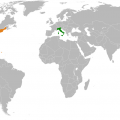The debate in the United States over relations with China is passionate—and not remotely sterile. It’s a multidirectional route between legislators, lobbyists, public opinion, the press, and universities. Perspectives are obviously complex and their articulation cuts political memberships. If an ideological opposition to China’s exuberance exists in principle, economic convenience pushes for maintaining friendly relationships with Beijing from the converse. However, this second position is losing strength, also due to the approaching presidential election to determine Obama’s successor. More and more frequently, citizens view China as a threat instead of a source of business. These terms of the debate are known, but the aspect of the legal responsibility of Chinese companies active in the US services sector adds to this. Obviously, the theme is not well known to the general public; nevertheless its impact is easily imaginable. The framework is China’s appetite for the capital necessary for expansion. The renminbi is not internationalizes and the capital markets are still anchored on Wall Street. The largest US IPO was launched on the NYSE, Chinese magnate Jack Ma’s Alibaba. Not surprisingly, by now a plethora of Chinese banks, financial institutions, and listed companies are active in the US. Some experts view the expansion hopefully. They believe that US laws are inviolable and that the business environment will positively infect Chinese companies and convert them completely to a market economy’s rules: transparency, responsibility, and respect for competition. However, a series of cases contradicts this opening and has given strength to more intransigent opinions. The real problem to solve is where US jurisdiction ends when it comes to Chinese companies. Obviously, Chinese companies operating within US federal territories are subject to local laws, but they’re often not the final deciding factors, as opposed to their parent country. As a consequence, every judiciary appeal needs to be consigned in China. The Hague Convention on private law that allows the transmission of legal acts with dedicated channels other than diplomatic has existed for years. Even if China was a signatory in 1997 (the US in 1972), dispute management has had a lot of sand in its gears. Not ironically, the country knew to build some Chinese boxes that don’t help identify who is really responsible for real or presumed legal violations. When you reach the responsible party, the “state secret” clause is triggered. The slow bureaucracy is responsible for the rest, the need to translate, and viscous decision-making. The most likely outcome of the debate in Washington is the assigning of more responsibility to the representatives of Chinese companies in the US active in finance and services. It probably represents the most indicated solution against procedural impotence. It’s the indirect confirmation that the rubber wall erected wisely by Beijing is stronger than the brick Great Wall, which was easily penetrated by Mongol horsemen.
Share

















